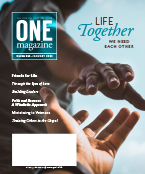
December 2021- February 2022
We Need Each Other
------------------
|





Speaking of the Practical
By Bill and Brenda Evans
Talk to Matthew Steven Bracey 15 minutes, and he will raise the word practical at least once. Rattle on with him for three hours or more as we did recently, and practical may turn up a dozen times. That’s not surprising from the 35-year-old who asked so many questions at age 14 that his youth group took matters into their own hands. As Matt tells it, “I was asking a thousand questions—being so annoying that some people in my youth group bound me to a tree with duct tape, feet off the ground and mouth taped shut. According to a personality test I took much later, I’m an introvert.”
Go figure that.
But it’s good Matt didn’t stop asking questions. His questioning, then as now, has spurred him to more serious inquiry, especially in ethics, history, law, and theology. In fact, the topic for his ongoing Ph.D. dissertation considers aspects of practical theology from the writings of Edmund Burke.
For Matt, the practical is about a Christian’s lived life—ordinary actions rooted in sound reason, logic, ethics, theology. Practical living that does not hide behind abstractions. Ordinary is another word that shows up often. As a teen, Matt decided to live in “ordinary day-to-day faithfulness.”
That decision was the first of three unswerving commitments that have shaped the past two decades of his life. Three applied decisions, not just ideals or concepts. Steadfast actions in real time and at the right time.
The first decision arose around a bonfire at Cumberland Youth Camp when Matt was 14. “It was a Thursday night. Some were doing testimonials; I was quiet. But there was a sense of conviction going on in me and a question: What am I doing to get where Eric is? (Eric Thomsen was his youth leader and Christian model.) It was like an image, a picture to me—ordinary, not mystical. I wanted and needed to get things right. It was a wrestling with faith, an exercise of the mind. I decided to focus on ordinary faithfulness each day, and I committed myself to that
and did it.
“Later, when Eric taught through 1 John, he said, ‘Memorize 1 John and I’ll take you on a trip.’ So, I did. Eric’s father, Neal, was a mentor, too. When I turned 16 and Mr. Neal turned 64, I said he was 16 like me because he was born on Leap Day, with a true birthday every four years. I still have a four-inch binder of things he mailed me from Florida where he lived. Ordinary things: reflections on how to be faithful, persevere through trials, use time wisely, and have a clean thought life.”
Matt’s second practical decision was to attend Welch College after high school. The third was to ask Sarah to be his wife. She said yes, got her Ph.D. in psychology and counseling, and now works at Welch College, as does Matt. “Time has a way of maturing our thoughts,” he reflects. “When we make decisions, we don’t know how momentous they are until we look back. The Lord has led me through ordinary choices. Now I can see what He’s done in my life. All glory to Him—Lord of Light, Lord of Rescue.”
After Welch College, Matt continued his education, earning a J.D. (Doctor of Law) and M.T.S. (Master of Theological Studies) from Samford University. He is currently in the dissertation stage of a Ph.D. in Christian Ethics and Public Policy with a minor in philosophy at Southern Baptist Theological Seminary.
At Welch College, Matt is a professor of ethics, doctrine, foundations of law, and church and culture. He is also the cross-country coach and vice provost. Matt sees connections in the courses he teaches. “The application of ethics rests in doctrine. In the law course, we talk about defining justice; we go back to the Bible, Aristotle, and ferret out what it means to be just. We address current buzz words like equity, as we Christians engage in our culture. We look at the arts, entertainment, economics, politics, our vocations.” And as cross-country coach, Matt practices what he teaches. He runs at least 30 miles a week. And, on their rural five acres, Matt says he’s an “academic agrarian,” planting a garden and raising animals. Ordinary. Practical.
As vice provost, Matt says, “Lots of plates are spinning, but I like it. I’m a detail person and very particular.”
Attention to details is requisite for an administrator who deals with academic affairs such as contracts, who teaches what and when, adjunct professor interviews, building curriculum around degree programs, faculty evaluations, graduation requirements, and accreditation processes.
In addition, Matt is an ordained Free Will Baptist minister who speaks and writes often. “God’s work in my life has been through teachers and writers, so it’s no wonder He led me to teach and write. It’s my duty to write, and I do so because there is something within me I must get out. It’s
a snapshot of where I am, on that topic, at that moment.
I don’t claim to be the last word on it. I also write to figure out what I think; it’s a way to work out ideas.”
In 2011, Matt, Jesse Owens, and Jackson Watts founded the Helwys Society Forum as an outlet for broader dialog on social, theological, cultural, and ministry issues in essays, articles, interviews, and book reviews. In early 2020, the HSF launched a new arm called HSF Conversations. Matt explains: “In spoken words, rather than essays, we address current issues, bounce ideas back and forth, debate, and offer wider perspectives and broader conversations on various topics.”
Among Matt’s many topics for writing, two stand out: adoption and death. Matt speaks first-hand about adoption. His father adopted him after marrying Matt’s mother. “He was my daddy. I always knew I was adopted, but I was as much his own as his two biological daughters. Some people say, ‘I want my own children.’ Well, adopted kids are your own kids. I’ve written about adoption for the Forum. It is a pro-life ethic, a theological issue that communicates the image of God as Father, the God of life and human flourishing. A pro-life ethic is not only about abortion. It’s also about fostering, adoption, orphan care.”
At age 69, Matt’s father died of cancer. In a moving article in ONE Magazine, Matt wrote about his father’s life and death. When his father asked Matt the best way to legally prepare for his death, Matt recommended the Free Will Baptist estate plan through Free Will Baptist Foundation and partner Cornerstone Estate Planning. The centerpiece of the plan is a revocable living trust that gives participants more control, is simpler to settle than a will, and keeps probate court out of the settlement. His father arranged the trust and named Matt successor trustee. After his father’s death, Cornerstone saw to it the settlement went smoothly.
While the legal side was quick, divvying up his father’s personal things took time. “Daddy was a millwright and mechanic with a shop, a shed, and various other holdings on his property—not just a house. He kept everything. I went through every piece, every page, remembering what Neal Thomsen once told me: ‘Don’t take shortcuts or you’ll get cut short.’ The legal part went well. I needed to do that other part well, too.”
Matt notes that settling the estate was not easy. “By nature, I am a cheerful person, but during those days, a cloud hung over me. The legal side was easy, but the personal side…there was that cloud. People said hurtful things—true words at the wrong time, words that hurt. The most meaningful people were those who shared my sorrow without attempting to fix it. What should you say to those in anguish? My experience suggests less is more.”
Timing is everything. Say less, not more to the grieving.
Live practically. Be faithful in the day-to-day. Words of wisdom and sound advice Matt often speaks and writes about.
About the Author: Bill and Brenda Evans live on the banks of Rockhouse Fork Creek in Ashland, Kentucky. They may be reached at beejayevans@windstream.net.
|
|

